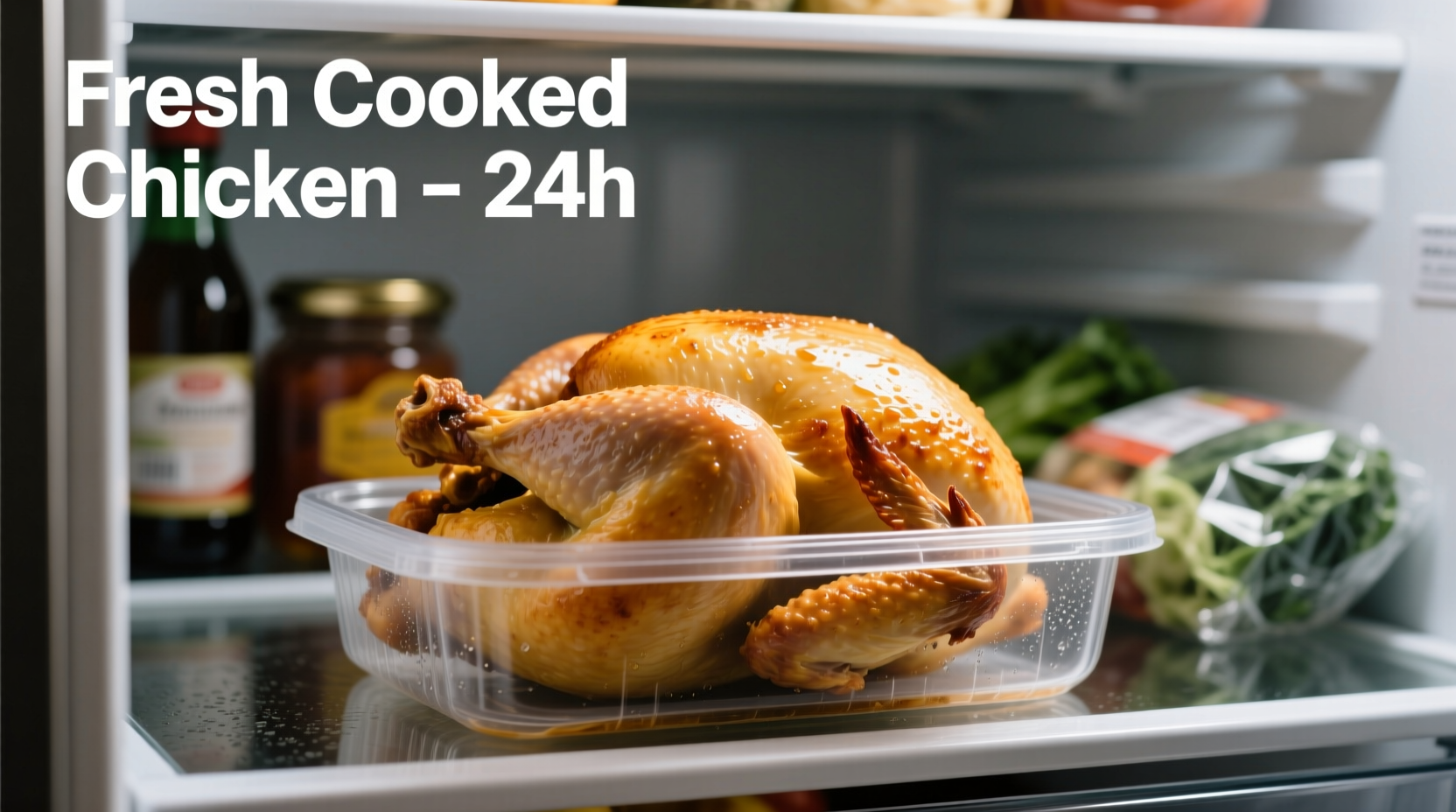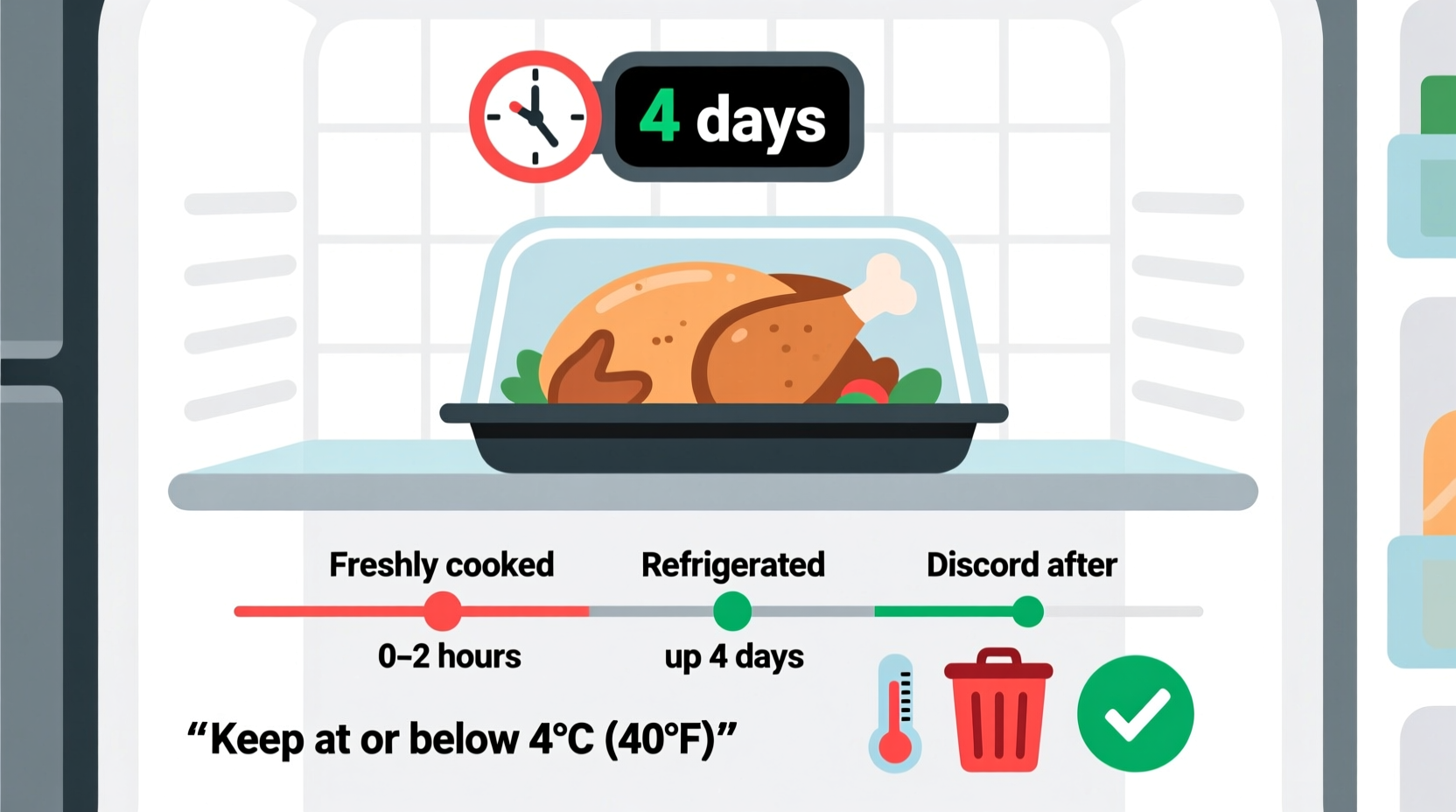Wondering if that leftover chicken in your fridge is still safe to eat? You're not alone. Millions of home cooks face this food safety dilemma weekly. Getting this wrong could lead to foodborne illness, while throwing away safe food contributes to unnecessary waste. In this guide, you'll discover exactly how long cooked chicken stays safe in your refrigerator, clear visual indicators of spoilage, and professional storage techniques that maximize freshness without compromising safety.
The Science Behind Cooked Chicken Shelf Life
Understanding why cooked chicken has a limited shelf life starts with bacterial growth patterns. When chicken is cooked properly, it reaches temperatures that kill harmful bacteria like salmonella and campylobacter. However, once removed from heat, the cooling process creates conditions where bacteria can multiply rapidly.
The USDA identifies the "temperature danger zone" as between 40°F and 140°F (4°C-60°C), where bacteria double in number every 20 minutes. Your refrigerator must maintain temperatures at or below 40°F to significantly slow this growth. Even in proper conditions, bacteria continue multiplying at a slower rate, which is why the 3-4 day limit exists.
Maximizing Freshness: Storage Techniques That Work
How you store cooked chicken dramatically impacts its actual shelf life. Follow these professional storage methods to ensure your leftovers remain safe and delicious:
- Immediate cooling: Divide large portions into smaller containers to cool faster (within 2 hours of cooking)
- Airtight containers: Use glass or BPA-free plastic containers with tight seals
- Shelf placement: Store on middle refrigerator shelves, not in the door where temperatures fluctuate
- Temperature verification: Use a refrigerator thermometer to confirm consistent 40°F or below
Professional chefs like Antonio Rodriguez emphasize that "the quality of your storage containers matters as much as the refrigerator temperature. Investing in proper containers can extend the quality window by a full day while maintaining safety standards."
When Leftovers Become Unsafe: Clear Warning Signs
While the 3-4 day rule provides a general guideline, visual and sensory indicators offer the most reliable assessment of whether your cooked chicken remains safe to eat. Watch for these critical warning signs:
| Indicator | Safe Condition | Spoiled Condition |
|---|---|---|
| Color | Consistent white or light brown | Grayish hue, green or yellow spots |
| Smell | Mild cooked chicken aroma | Sour, ammonia-like, or sulfuric odor |
| Texture | Firm, slightly moist | Slippery film, slimy surface |
| Taste (if unsure) | Normal flavor | Sour or "off" taste (spit out immediately) |
When in doubt, throw it out. The USDA Food Safety and Inspection Service states that "if cooked chicken develops an unpleasant or sour odor, it should be discarded immediately, regardless of the number of days stored."

Special Considerations: When the Rules Change
Certain conditions can shorten or extend the safe storage window for cooked chicken. Understanding these context boundaries helps prevent both food waste and foodborne illness:
- Soups and stews: Cooked chicken in liquid lasts 3-4 days, same as plain chicken
- Sauces and marinades: Acidic ingredients (tomato, lemon) may extend safety to 4 days; dairy-based sauces reduce to 2-3 days
- Reheating impact: Each reheating cycle reduces shelf life by 1 day
- Freezing option: Properly frozen cooked chicken remains safe indefinitely (best quality within 4 months)
The FDA Food Code specifies that "cooked chicken combined with other potentially hazardous ingredients follows the shortest shelf life of any component." This means if you've added mayonnaise or dairy products, the 3-4 day window may be significantly reduced.
Food Safety Timeline: What Happens Day by Day
Understanding the progression of bacterial growth helps identify when chicken transitions from "safe but declining quality" to "potentially hazardous":
- Day 1: Peak freshness and safety. Bacterial growth minimal when properly cooled and stored.
- Day 2: Quality remains excellent. Early bacterial growth begins but remains at safe levels.
- Day 3: Quality starts declining. Bacterial counts approach threshold levels. Consume by end of day.
- Day 4: Safety threshold reached. USDA recommends discarding after 4 days regardless of appearance.
- Day 5+: High risk of foodborne illness. Discard immediately even if no visible spoilage signs.
This timeline assumes consistent refrigerator temperatures at or below 40°F (4°C). Temperature fluctuations or improper storage can accelerate bacterial growth, making chicken unsafe before the 3-day mark.
Practical Food Safety: Making Smart Leftover Decisions
Professional kitchens follow the "first in, first out" (FIFO) method for managing leftovers. Implement this system at home by:
- Labeling containers with preparation date
- Storing newer leftovers behind older ones
- Designating a "use first" section in your refrigerator
When reheating, ensure chicken reaches an internal temperature of 165°F (74°C) to eliminate any bacteria that may have developed during storage. The USDA Meat and Poultry Hotline confirms that "proper reheating kills bacteria but doesn't eliminate toxins that some bacteria produce during growth."
Frequently Asked Questions
Here are answers to the most common questions about cooked chicken storage:
Can I eat cooked chicken after 5 days in the refrigerator?
No, the USDA Food Safety and Inspection Service recommends discarding cooked chicken after 4 days in the refrigerator. Consuming chicken stored longer than 4 days increases your risk of foodborne illness, even if it shows no visible signs of spoilage.
Does freezing cooked chicken extend its safety period?
Yes, freezing cooked chicken stops bacterial growth completely. While safe indefinitely when frozen, cooked chicken maintains best quality for 4 months. Always freeze within the 3-4 day refrigerator window and use airtight packaging to prevent freezer burn.
How can I tell if cooked chicken has gone bad if I can't smell anything?
Check for visual and textural changes. Spoiled chicken often develops a slimy film, changes color to grayish or greenish hues, and may feel tacky to the touch. If you notice any of these signs, discard the chicken immediately regardless of odor or storage duration.
Does reheating spoiled chicken make it safe to eat?
No, reheating cannot make spoiled chicken safe. While heat kills bacteria, it doesn't eliminate toxins produced by bacterial growth. Consuming reheated spoiled chicken can still cause food poisoning. If chicken shows any signs of spoilage, discard it completely.











 浙公网安备
33010002000092号
浙公网安备
33010002000092号 浙B2-20120091-4
浙B2-20120091-4